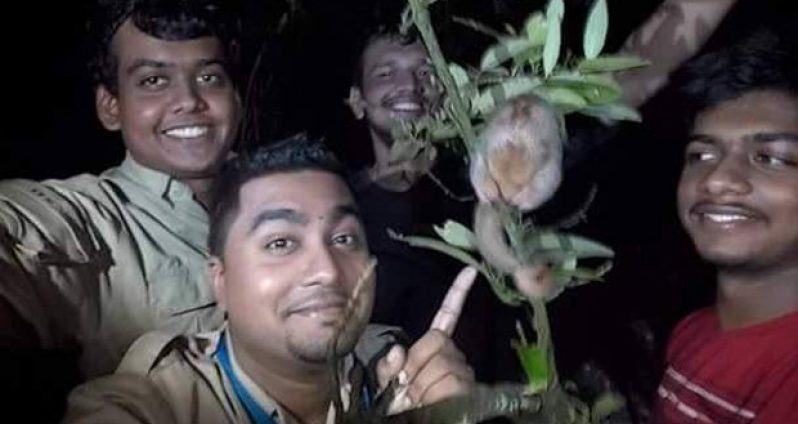(Trinidad Express) A NEWLY formed wildlife conservation group is attempting to bridge the gap between hunters and conservationists, and is calling for sustainable hunting by hunters.
Wildlife and Environmental Protection of Trinidad and Tobago (WEPTT) is promoting sustainability regarding wildlife in Trinidad and Tobago.The members of the organisation include Kishan Ramcharan (Forester I) and conservationists Kristopher Rattansingh, Kristian Rattansingh and Taariq Ali.
The conservationists have been making headlines lately with their volunteer efforts across the country. Their most recent rescues and relocations included the silky anteater, caimans in Valsayn and assistance with the bottlenose dolphin in Orange Valley. However their biggest breakthrough occurred while volunteering in collaboration with Rio Claro Police Station and Forestry Division which led to the arrest of a man who had snakes in his possession for the purpose of consumption last month.
They have also been involved with rectifying disputes between hunters and conservationists.
According to Rattansingh, the only side they have taken is that they want to ensure the continuity of Trinidad’s protected species and eliminate poaching whilst establishing the mutual agreement of sustainability between hunters and conservationists.
He said that there is a need for the push of the implementation of sustainable hunting, since the “concern is wildlife, having and protecting wildlife while we have it and so that their children and generations to come can have it too”.
Rattansingh said that there is a need for more wardens, “but if we strictly regulate how many animals of specific breed, size and species and hold hunters responsible for their catches with systems such as tagging (hunters purchase tags for each of their kills, where they will have to document each kill per tag and return that documentation to forestry for accountability)”, said Rattansingh.
According to Rattansingh, the accountability comes with enforcement by game wardens and if while patrol they find people with untagged animals the violators can be fined and licenses revoked.
He said, “One of the issues that needs to be addressed is that I know of many poachers who want to apply for the honorary game warden program so they can have respective access and powers to use that loophole and poach without being caught. Which I personally (not WEPTT) think that banning wardens themselves from hunting is a good combatant of this loophole. I think it’s a reasonable sacrifice for being a warden”.
He also said that the game wardens and Forestry officers need to be armed as these officers encounter armed hunters and poachers in areas unfamiliar to many and have nothing and no one to protect them.
Rattansingh is suggesting a ban on the commercial sale of wild meat which he believes is a major reason for the extreme poaching which is occurring.
He said, “A ban on commercial sales should have happened yesterday. Wild meat being sold commercially is one of the biggest problems we face. Not only does it promote poachers but it enables them. If they can’t sell it, poaching will decrease. Please note, decrease not stop. Another thing is many of these people who stand on streets selling wild meat is mostly an illegal trade. Many of those vendors don’t have permits to possess the animals they sell. The next thing is many of the consumers don’t have permits to possess the animals they purchase. These are violations of the conservation of wildlife act, section 5 2(b) which states that it is illegal to possess an animal or any part thereof without its respective permit”.
Rattansingh is also calling for law reform. He said the current act that affects Wildlife, The Conservation of Wildlife Act, Chapter 67:01 is in desperate need of revision. The fines in place are almost non-existent and do nothing to put a real dent in the crimes that are being perpetrated.
He said there is desperate need for the revision of listed species and the laws themselves. “The fines themselves need to be increased, so our protected animals are actually protected and violators need not worry about only losing some pocket change”, said Rattansingh.
He said that education is key and “if people understood the importance and necessity of our local wildlife, they would have more respect for their lives too”.
New conservation group: Ban commercial sale of wildmeat
SHARE THIS ARTICLE :
Facebook
Twitter
WhatsApp





.jpg)








